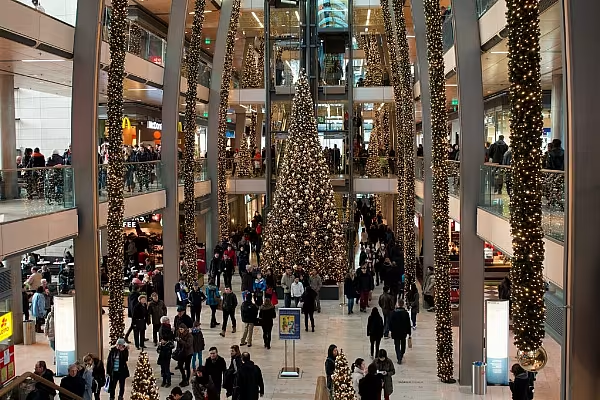Accenture's recent Retail Executive Survey found that two thirds of retail executives have set higher profit margin targets for this holiday season, while three fifths (60%) will be taking 'extraordinary measures' to ensure that their supply chain will be capable of dealing with the challenges associated with the coming festive period.
Given the rapidly changing nature of the retail sector at present, and the pressure this is putting on forecasting, fulfilment, space planning, and promotions management, Accenture recently announced a partnership with RELEX Solutions, to assist clients in tackling a pace of change that puts them in a constant state of 'response mode'.
ESM caught up with Jill Standish, Accenture’s Retail lead, and Laurence Brenig-Jones, VP of product strategy at RELEX Solutions, to talk about the partnership, as well as how retailers need to be thinking about stock and fulfilment to ensure they are not facing any out-of-stocks this coming season.
ESM: To start, maybe you can tell me about how Accenture and RELEX came together, and the nature of this partnership?
Jill Standish: At Accenture, one of the things that we look for in the industry is ways in which we can help our clients deal with the challenges they are facing, like eliminating food waste and helping them with their supply chain operations.
RELEX came onto our radar based on a lot of the work we are doing across Europe, and I travelled to Helsinki a year ago to meet with the founders and the team. They have at their core a commitment to help businesses focus on things that add value, plus they have fantastic technology to support that. We were very interested in partnering with a company like that.
What's interesting about the partnership is that we're taking our experience in business advisory, and change management and adoption, and we're partnering with the technology that comes from RELEX around three big areas – forecast and replenishment, promotions, and space management.
ESM: The Christmas period is now upon us, and if we think about the things that have had an impact in recent festive periods, there was the cost of living crisis, supply chain issues, a perfect storm of things happening. Plus, there as a realisation that maybe supply chains, as they traditionally were for Christmas, weren't exactly fit for purpose?
Laurence Brenig-Jones: Generally when it comes to Christmas, and the whole holiday season, it can make or break a whole financial year for a retailer. There's so much pressure, and I think one of the reasons for that is the capacity situation.
There's finite capacity throughout the whole end-to-end process, all the way from goods receiving into DC, picking, outbound, receiving in stores, putting onto shelves, everything.
You would never have the ability to invest in all that as it happened, so you are always trying to figure out how to plan in advance to smooth the volumes in an effective way – to ensure that you have the right people in place at the right time to do the right thing.
But that’s a huge challenge in a market that’s so uncertain. The pandemic caused chaos in terms of demand history, so it makes it even more difficult to predict what’s going to happen. Also, consumers are having a tough time due to the effects of inflation, interest rates, and all those economic factors.
Retailers are finding it more difficult to predict what's going to happen. But you need to ensure that as a grocer, you're prioritising your range in the right way – cutting out products that are not necessarily driving value and tailoring your space to local needs. There are all sorts of challenges in understanding consumer behaviour.
Particularly when it comes to fresh products, much more precise planning is required. If you bring in stock too early, the shelf life is not going to last. If you do it too late, you’ll miss the demand. So you really need more precision in the flow of fresh inventory as you run up to peak trade.
Jill Standish: For grocers, this is their time to shine. Particularly when it comes to Christmas dinner – if you run out of turkeys, good luck, consumers are going to go somewhere else.
RELEX has done a fantastic job of making sure retailers can spot demand and then look through the value chain of how everything flows, making sure that it's spot on.
That’s one thing that’s different from years past – people are spending less, but they're not going to skimp on the main Christmas meal.
ESM: The inflationary period of the past year or so has taken a lot of buying departments off-guard – they have been used to an environment of consistently low food prices for some time now. So, planning has to change, augmented by technology, right?
Laurence Brenig-Jones: Certainly, our view is that there is a huge amount of decision-making that you can improve and automate with data and science, and we provide technology to help with that, as well as allowing humans to do what they do best, which is collaborate, focus on innovation, and create new concepts.
I think there’s a huge amount of time wasted at the moment in grocery retail organisations, whether that's in the supply chain or commercial department, where they are probably looking backward at analytics too much, instead of understanding what's happening, or what's going to happen in the future.
Areas like supply chain have always had a huge volume of decisions every day – hundreds or thousands of order proposals being created – and that’s a process that has become increasingly digitised, or is in the process of becoming digitised. And there’s lots of potential there to build on that.
Jill Standish: One of the things that I've learned with RELEX over the last year is they provide transparency into ‘why’ things are the way they are.
If you've got a planner or a merchant, and you're trying to get them to adopt new behaviours – such as changing the price of a certain item – you're going to have to give them some reasons for them to actually believe it.
For example, where there's an out-of-stock situation at a store. ‘OK, why is that?' Is it because the truck didn't show? Is it in the backroom? Is it because there's a supply constraint? Did someone cancel the order? By enabling people to understand the reason behind a particular recommendation, that’s powerful stuff.
This is part of the learning curve that we're going through with technology. Don't just give me the answer. Tell me why you came up with that answer.
ESM: Many retailers this year, because of pricing pressures, or because of supply chain costs, are under pressure to make more profits. They're under pressure to drive those margins up while at the same time dealing with increased complexity. A more efficient system will lead, in theory, to higher profits and higher margins. It's just a question of how effectively it can be integrated and how much it's trusted?
Laurence Brenig-Jones: The thing that comes into my mind is promotions. We know, for example, that something like a third of promotions, when you look at them in isolation and understand them at a granular level, they don't actually add anything.
Then you have another third which may even have a negative impact, because the impact on the operation is not generally taken into account, and it costs a lot of money to execute them. Then there are a bunch of promotions that are adding value, but in many cases the visibility is not there.
So, you end up doing similar stuff that you did last year, seeing an overall uplift in sales but not really knowing where it's come from, or not knowing which products are the ones that are driving value.
That's one example where we're helping our customers to gain that transparency, and then using that intelligence to plan forwards and test out different scenarios so that they can understand which one adds the most value.
Jill Standish: It’s also important to note that we're seeing a more condensed shopping season here. People aren’t shopping for the holidays as early as they did in past seasons. There’s a feeling of ‘I’m going to wait and see how I’m doing financially’.
That also means that the retailer needs to be pretty adaptable, because was I mentioned earlier, if there's a run on turkeys at the last minute, how easily can you flex?
It comes down to how quickly you can understand what’s happening, and then how you can react. In order to be very agile as Christmas approaches, the only way to do that is through technology, I believe. There's no way that companies can be that agile without assistance.
ESM: This level of hyper-flexibility, if we can call it that, was something that emerged during the pandemic – being able to turn on the head of a pin, and develop an omnichannel solution in the space of a couple of weeks, for example. But that way of thinking has persisted, to a certain degree.
Jill Standish: It has. One CEO I talked to recently said that in the past, it would always take time to make strategic decisions, that he had to get consensus. During the pandemic, it was basically ‘just do it. We'll figure that out later. Just do it’.
He said that actually created better decision making because the company was on the move, making decisions every day, and getting things moving. That changed what leadership is about, and how to approach problems.
Laurence Brenig-Jones: One example that we've seen is there's a greater appetite to collaborate with suppliers, again using data to inform decision-making.
Sometimes, if you were running up to Christmas, you would think everything was fine, and then suddenly, with a day to go, you find out that you don’t have enough stock, or that you haven't received all of the inventory from the supplier. This can send a huge shockwave through a business. You have to replan, rethink, re-space, or get a new product in.
So, I think we've seen an increasing focus on being open and transparent with suppliers in that respect. This is partly so that they can get ahead of all of these shocks that are going through the supply chain, and some of the unknown issues that are cropping up.
ESM: With Christmas around the corner, are there any ‘quick wins’ that grocers can implement in their business, in your eyes?
Jill Standish: I would say, focus on your people. It's a tough time to be working in a supermarket. You can have the best forecasting, the best replenishment, the best shelves, the best signage, the best promotional material, but if your people aren't engaged? Not good.
Plus, if you have a supply issue, good people can go the extra mile with consumers, and make them understand the situation. The people element, right now, is a big deal.
Laurence Brenig-Jones: Have a single plan in your organisation. A single plan, across supply chain, merchandising and operations, so that people can understand how everyone in the business is working together.
So often, people are focusing on their own thing, it’s not joined up, and that causes a lot of tension. I would say, look to set up a way of working that’s unified, even though the data might not be at this stage.
For more information, contact Accenture here, or RELEX Solutions here.














